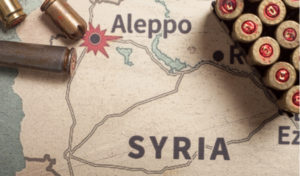At The American Conservative, Pat Buchanan worries that with ISIS failing, the way will be paved for Iran to dominate Iraq and Syria. What then? Will the U.S. fight to prevent Iranian control of the Shia Crescent, or will America turn its back on the Kurds who helped defeat ISIS?
Every war in the Middle East seems to create a new war behind it. The power vacuum left in northern Iraq and Syria must be filled, the question is who will it? Do the American people have any interest in fighting another war in the Middle East? Surely not. But Israel is already antagonizing Syria, and a war between Syria and Iran on one side and Israel on the other would likely draw in the U.S. Pat writes:
As their U.S. allies watched, the Kurdish peshmerga fighters were run out of Kirkuk and all the territory they had captured fighting ISIS alongside the Americans. The Iraqi army that ran them out was trained and armed by the United States.
The U.S. had warned the Kurds against holding the referendum on independence on Sept. 25, which carried with 92 percent. Iran and Turkey had warned against an independent Kurdistan that could be a magnet for Kurdish minorities in their own countries.
But the Iraqi Kurds went ahead. Now they have lost Kirkuk and its oil, and their dream of independence is all but dead.
More troubling for America is the new reality revealed by the rout of the peshmerga. Iraq, which George W. Bush and the neocons were going to fashion into a pro-Western democracy and American ally, appears to be as close to Iran as it is to the United States.
The U.S.-backed Syrian Democratic Forces, largely Kurdish, just annihilated ISIS in Raqqa and drove 60 miles to seize Syria’s largest oil field, al-Omar, from ISIS. The race is now on between the SDF and Bashar Assad’s army to secure the border with Iraq.
Bottom line: The U.S. goal of crushing the ISIS caliphate is almost attained. But if our victory in the war against ISIS leaves Iran in the catbird seat in Baghdad and Damascus, and its corridor from Tehran to Baghdad, Damascus and Beirut secure, is that really a victory?
Would President Trump be willing to fight a new war to keep Iran from consolidating its position in Iraq and Syria? Would the American people support such a war with U.S. troops?
The decision as to whether this country should engage in new post-ISIS wars in the Mideast, however, may be taken out of our hands.
Saturday, Israel launched new air strikes against gun positions in Syria in retaliation for shells fired into the Golan Heights.
Why would Israel wish to provoke a war with Syria?
Because the Israelis see the outcome of the six-year Syrian civil war as a strategic disaster.
Hezbollah, stronger than ever, was part of Assad’s victorious coalition. Iran may have secured its land corridor from Tehran to Beirut. Its presence in Syria could now be permanent.
And only one force in the region has the power to reverse the present outcome of Syria’s civil war—the United States.
The interventionist Post is saying: The situation is intolerable. Confront Assad and Iran now, or fight them later.
Trump is being led to the Rubicon. If he crosses, he joins Bush II in the history books.
Read more here.
If you’re willing to fight for Main Street America, click here to sign up for my free weekly email.










